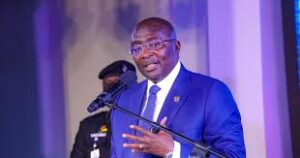Veep’s Advisor: Mahama’s Sinking Fund and IMF Commitment Contribute More to Economic Stability Than Gold-for-Oil

Professor Sharif Mahmud Khalid, economic advisor to Vice President Naana Jane Opoku-Agyeman, has clarified that the recent stability in Ghana’s economy is not solely the result of the gold-for-oil programme initiated during the previous administration. In an interview on Channel One TV on May 20, 2025, Prof. Khalid emphasized that various measures, including the servicing of the IMF loan and the activation of a sinking fund, have played a significant role in managing the nation’s economic challenges.
Prof. Khalid was responding to claims made by former Vice President Dr. Mahamudu Bawumia, who suggested that the current administration had not been successful in stabilizing the country’s economy. According to Prof. Khalid, while the gold-for-oil programme was indeed a factor, it should not be viewed as the primary or sole contributor to the country’s economic progress.
He further explained that the gold-for-oil programme was not a Ghana-specific initiative. Many central banks in emerging markets adopted similar measures after the COVID-19 pandemic to shore up reserves and stabilize their currencies. However, Prof. Khalid pointed out that during the implementation of this programme, Ghana still struggled with high inflation and currency volatility, indicating that it was not a panacea for all the country’s economic challenges.
In addition to the gold-for-oil initiative, Prof. Khalid highlighted the importance of other critical steps taken under the previous administration, such as servicing Ghana’s IMF loan facility and continuing the domestic debt exchange programme inherited from the previous government. Another vital measure he referenced was the revival of the sinking fund, which was designed to meet the country’s debt obligations. Prof. Khalid emphasized that these actions required close cooperation between the executive branch, the Bank of Ghana, and the Ministry of Finance.
“The alignment between these institutions has brought a sense of discipline, contributing to the recent stability of the cedi,” Prof. Khalid explained. He pointed to the government’s budget proposal as a key strategy to reduce inflationary pressures and ease the burden on Ghanaians facing high living costs.
Despite acknowledging the ongoing hardships, particularly for traders in Accra’s Makola Market, Prof. Khalid expressed optimism that the government’s efforts were creating the necessary conditions for recovery. He also highlighted President Mahama’s announcement of a planned $10 billion economic stimulus package as a significant step to support growth and job creation. According to Prof. Khalid, such initiatives will help sustain the country’s economic recovery and lay a foundation for long-term prosperity.
In response to Dr. Bawumia’s criticisms of the current administration, Prof. Khalid questioned why the former Vice President was dismissing the continuity of government efforts. “If we are talking about government being a continuum, why is he saying we’ve done nothing?” Prof. Khalid asked, noting that the current government inherited a substantial public debt of GH¢721 billion, with projected debt servicing costs of GH¢280 billion over the next four years.
Prof. Khalid stressed that while the current administration faced significant fiscal challenges, it was taking practical steps to manage these issues without making unrealistic promises. He also stated that the government was focused on ensuring that all actions taken were responsible and sustainable in the long run.
Ultimately, Prof. Khalid’s remarks highlighted that while the gold-for-oil programme may have been one aspect of Ghana’s economic recovery, it was far from the only factor. The previous administration’s efforts, particularly the servicing of the IMF loan, the continuation of the debt exchange programme, and the activation of the sinking fund, all played critical roles in stabilizing the economy. Moving forward, he emphasized that it is essential for Ghana to continue addressing its fiscal challenges with a well-coordinated approach, which will enable the country to recover fully and sustain long-term growth.
In conclusion, Prof. Khalid underscored that Ghana’s economic stability is the result of a comprehensive strategy that extends beyond a single initiative. It is a combination of sound economic management, international cooperation, and careful fiscal oversight that is ultimately paving the way for recovery and future prosperity.






